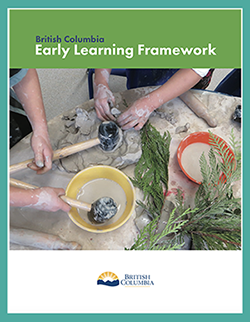Module 1: The Principles of Early Learning
Legislation, Frameworks and Human Rights Agreements
The Early Learning Framework explores the following legislation, agreements, and frameworks that affect early care and learning.
The United Nations Declaration on the Rights of Indigenous Peoples states
- Indigenous children and youth should be free from discrimination at all levels of education
- Indigenous peoples have the right to access education in their own culture. It should be provided in their own languages and traditions
- Indigenous peoples have the right to pursue self-government. They have the right to develop and control their own education systems and institutions
The United Nations Convention on the Rights of the Child confirms the inherent dignity, and the equal and inalienable rights of all members of the human family, including children. It is necessary for freedom, justice, and peace in the world.
The CMEC framework presents a vision for early learning for the whole country. It uses this vision to shape systems, policies, curriculum, and practice. This shared vision is critical. It ensures that all early learning settings, at all levels of the system, have continuity and quality.
The long-term vision of the Multilateral Early Learning and Child Care Framework is all children experience quality early learning and child care that supports them to reach their full potential.
The framework involves the federal, provincial, and territorial ministers who are responsible for early learning and child care.
The principles in this framework came from Indigenous peoples across the country. It describes actions that will affect Indigenous people regarding
- Governance
- Service
- Quality of programs
- Funding
- Research
- Capacity development
The Government of Canada has created an Indigenous Early Learning and Child Care Framework to guide communities across the country.
The Métis Nation Early Learning and Child Care Accord has a goal of implementing the ELCC framework. It sees the Métis Nation as a distinct culture. It supports that culturally appropriate and high-quality early learning and child care programs are needed for Métis children and families.
These competencies set out the knowledge, skills, and abilities that early childhood educators must demonstrate to be certified in B.C.
The Early Learning Framework and the B.C. Curriculum share a philosophy. They provide guidance for children birth to eight years. They give students more chances to explore, develop skills, and include Indigenous perspectives.
